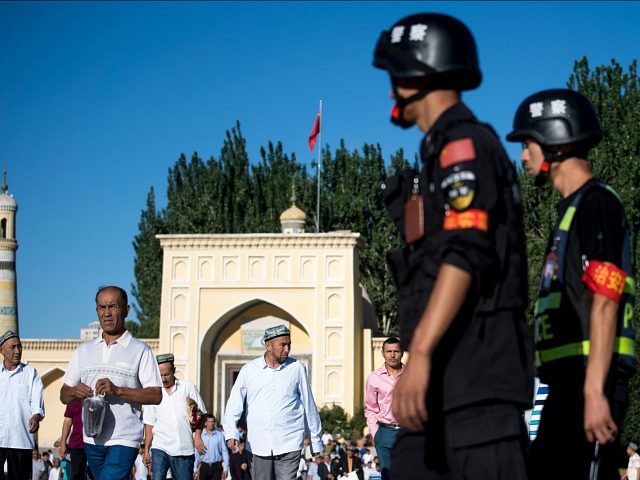China’s state-run Global Times newspaper argued in a column Tuesday that banning all religious garments in public is necessary to achieve “social unity” and contended the act does not portray “religious hatred.”
“The call to ban burqa in public is justified for consolidating social unity, cohesion, and stability, especially at a time when religion can easily trigger confrontation and conflicts,” China’s state-run outlet the Global Times wrote on Monday.
The publication went on to note that “many Europeans have blamed the newcomers from Muslim majority countries for worsening security,” and that “Islamophobia has been rising across the continent after terrorist attacks launched by extreme Islamists.”
It added, “Let’s be clear: Banning the display of religious symbols in public is not religious hatred. Public spaces are shared by all and should be dominated by no one.”
Global Times continued, “Displaying one’s religious identity in public lacks respect for those who do not believe in any religion and those who oppose the presence of religion in public life” and noted the belief that secular countries are “supposed to” do things like implement “local or nationwide bans on hijabs, niqabs and burqas, “and more countries such as the United Kingdom and Germany are likely to follow suit.”
Under Communist Party leader Xi Jinping, China has launched a widespread campaign to eliminate all religions from the public eye. Islam, Christianity, and Tibetan Buddhism have become the targets of the most violent crackdowns.
China has detained hundreds of thousands of Uighur Muslims in what they are calling “political education camps” in the country’s Xinjiang province, where most Uighurs live, according to the State Department’s International Religious Freedom Report for 2017.
In December 2014, China banned the burqa in Xinjiang’s capital, Urumqi, and in 2015, the Xinjiang government reportedly forced shops to sell alcohol and cigarettes to “weaken” religion in the area. The legislation was reportedly the latest in a series of laws intended to eliminate Islam from China.
That same year, China sentenced a Chinese couple to several years in prison for wearing overtly Islamic fashions in Xinjiang and additionally sentenced the man to six years for sporting a beard and the woman to two years for wearing a burqa.
Chinese authorities have also launched a campaign to demolish churches and remove crosses from public view. Earlier this year, China’s paramilitary People’s Armed Police reportedly used dynamite and excavators to destroy the Golden Lampstand Church, a Christian megachurch, which has over 50,000 congregants. In 2016, it was reported that Ding Cuimei, the wife of Chinese Pastor Lian Jiangong was killed after she was buried alive during the government-sponsored demolition of their Beitou Church in Zhumadian in the central Henan Province.
On Monday, the South China Morning Post reported that “A prominent underground church in southwestern China was raided by police on Monday afternoon, hours before a planned evening service to commemorate the Tiananmen Square anniversary.”
Further, thousands of Chinese Christians in an impoverished part of China’s rural southeast have been told they must switch their posters of Jesus with portraits of President Xi Jinping as part of a local government’s poverty-relief program that seeks to “transform believers in religion into believers in the party.”
China’s dispute with and disdain for the Dalai Lama is no secret. The exiled spiritual leader has been denounced by the country’s Communist Party members as a “separatist,” a “wolf in monk’s robes,” and even as a supporter of the Islamic State.
Adelle Nazarian is a politics and national security reporter for Breitbart News. Follow her on Facebook and Twitter.

COMMENTS
Please let us know if you're having issues with commenting.